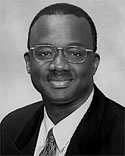Physician returns to his African village to drill wells
GREENVILLE, N.C. (Apr. 27, 2004) — Kadami, Uganda, and Greenville are figuratively and literally a world apart. No one can explain the differences better than Dr. Sylvester Odeke, who has a foot in both cultures.
As a physician at the Brody School of Medicine at East Carolina University, Odeke has the most up-to-date medical diagnostic equipment and tests for his patients. In Odeke’s native Kadami, the villagers simply want clean water. So in November, Odeke returned to his native village and contracted with a well-drilling company to drill two wells to provide clean drinking water.

Dr. Sylvester Odeke, clinical assistant professor at the Brody School of Medicine
“One of the things on my mind for a long time has been to get a source of clean drinking water for my village and the local primary school,” said Odeke, who was born and educated in Uganda. The school serves approximately 300 children and didn’t have a source of clean drinking water. The well at the school will also serve a wider community beyond the school grounds. The village has approximately 300 residents, including family members of Odeke. “A good many of them are my relatives,” he said. “Everybody there is related.”
Odeke, clinical assistant professor of internal medicine, provided the funds to dig two wells equipped with hand pumps to serve his village and the nearby school. The wells were dug to about 100 feet, deep enough to provide clean water through the year, including the dry season. Uganda is in eastern Africa with a population of approximately 26 million; Kadami is located in the Kumi district in the eastern part of Uganda.
Odeke’s original plan was to dig one 50-meter well at the school and to install a large water reservoir complete with a solar-operated pump so residents could easily draw water from the reservoir. Although this method would have been a more reliable and enduring source of clean water, it would have cost nearly $9,000 to complete, he said. Odeke and the well-drilling operator saw the immediate need and decided to dig two 30-meter wells instead. Odeke had already scheduled a hydro-geological survey, so the drill operator would know precisely where to drill.
The two wells and the survey cost $4,500. Most of the money came from Odeke, but he did receive $850 in contributions from friends in Pittsburgh and Philadelphia, members of his church, Faith and Victory Church in Winterville, and fellow faculty members in the division of endocrinology.
Odeke joined ECU in 2002 after practicing two years in Australia. He has a medical degree from Makerere University in Kampala, Uganda, and received a diploma and masters degree in tropical medicine and hygiene from the London School of Hygiene and Tropical Medicine. He completed his residency training at Mercy Hospital in Pittsburgh and a fellowship in endocrinology, diabetes and metabolism at MCP Hahnemann University in Philadelphia.
Before the wells, villagers got their water from hand-dug holes near a local swamp where water would slowly trickle. Women would walk a mile to a mile-and-a-half from the village each day to draw water for cooking and drinking and then walk back with the buckets on their heads.
“The water from the spring is not drinkable, but they would drink it. There was a high incidence of water-borne diseases. They don’t want to have to boil the water and then wait for it to cool down to drink,” he said. “When the water came up after we drilled, it looked like water should look — clear and drinkable.”
When the first pan of water was pumped from the ground, the villagers prayed and poured it onto the ground as thanks to God.
“If I had my way, I would buy a drilling machine” to provide wells throughout the other neighboring areas, he said.
The next project on Odeke’s list is much more ambitious – a 150-bed hospital.